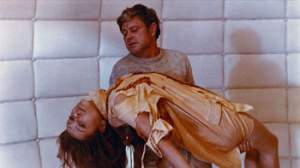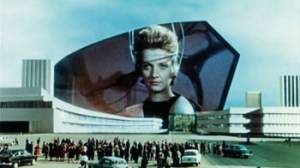
Alongside screenings of the more familiar classic Aelita, Queen of Mars (1924) and Andrei Tarkovsky’s Solaris (1972) and Stalker (1979), there will be surprising events such as Red Space (when Sergei Krikalev, the Head of the Yuri Gagarin Cosmonaut Training Centre will join in a day inspired by Russian cosmonauts), and a season introduction by Sergei Kapterev (from the Institute of Cinema Art in Moscow). For younger audiences there will be Rocket School, a week of lunar themed fun and film for kids, 26–29 July. This futuristic vision will screen in conjunction with the 50th anniversary of Yuri Gagarin’s momentous journey into space and the nationwide celebrations of the occasion, and his visit to London - including the unveiling of a statue on the Mall, commissioned by the British Council.

2011 also marks the 50th anniversary of the publication of Stanislaw Lem's novel Solaris, and would have marked the great writer's 90th birthday. KOSMOS presents a selection of rarely seen Eastern Bloc adaptations of Lem's trail-blazing fiction, including Kurt Maetzig’s classic The Silent Star (1959), drawn from his novel The Astronauts and following an international expedition to Venus, set in 1985; Icarus XB1 (1963), directed by Jindrich Polák and based on The Magellan Cloud, with cosmonauts who dress in black-tie for cocktail parties, while searching for life on distant planets; and The Interrogation of Pilot Pirx (1979), a Polish-Soviet co-production based on Lem's The Inquest. London-based partners also celebrating Stanislaw Lem this year include The National Theatre, the British Library and the Polish Cultural Institute.

The Soviet era’s optimistic golden age ended with the loss of the Space Race to the US at the end of the 60s. The onset of a deep, systemic economic crisis to the Russian space project found a new interpretation in Andrei Tarkovsky’s Solaris (1972) and Stalker (1979), probably the best known titles in the West from this period. Stalker raised the stakes by bringing science fiction down to Earth, portraying a poisoned post-industrial world that is stranger and more treacherous than the distant planets of the cosmos.
By the fall of the Soviet Union the histories and iconographies of the communist era could be openly interrogated. KOSMOS will present three key recent films – First on the Moon (2005), Dreaming of Space (2005) and Paper Soldier (2008) – which together can be seen as part of a revisionist process to re-evaluate the place of Russia’s legendary space programme in the cultural memory, without nostalgia for the repressive regime that sponsored it.
Full listings and booking details here.
Two win a pair of tickets to the screening of your choice from the Kosmos season, click on the link below.
This competiton has ended